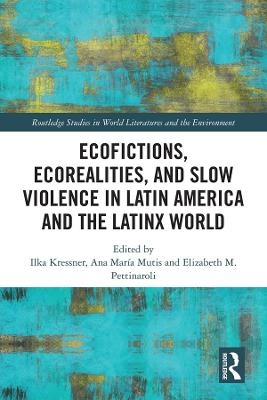
Ecofictions, Ecorealities, and Slow Violence in Latin America and the Latinx World
Routledge (Verlag)
978-0-367-42671-2 (ISBN)
The volume highlights the dense web of material relations in which all is enmeshed, and calls attention to a notion of agency that transcends the anthropocentric, engaging a cognition envisioned as embodied, collective, and relational. Ecofictions, Ecorealities and Slow Violence measures the breadth of creative imaginings and critical strategies from Latin America and Latinx contexts to enrich contemporary ecocritical studies in an era of heightened environmental vulnerability.
Ilka Kressner received her Ph.D. in Spanish from the University of Virginia. She is currently Associate Professor of Hispanic Studies at the University at Albany, State University of New York. Ana María Mutis received her Ph.D. in Spanish, University of Virginia. She is currently Assistant Professor in the Department of Modern Languages and Literatures at Trinity University. Elizabeth M. Pettinaroli received her Ph.D. in Spanish Literature at the University of Virginia. She is currently Associate Professor of Spanish Literature and Director of Latin American and Latinx Studies at Rhodes College.
Contents
Ecofictions, Ecorealities and Slow Violence in Latin America and the Latinx World
List of Figures
Acknowledgements
Introduction
Ilka Kressner, Ana María Mutis, and Elizabeth Pettinaroli
Part I
Bad Living: Mutations, Monsters and Phantoms
1 Monsters and Agritoxins: The Environmental Gothic in Samanta Schweblin’s Distancia de rescate
Ana María Mutis
2 Toxic Nature in Contemporary Argentine Narratives: Contaminated Bodies and Ecomutations
Gisela Heffes
3 The Ruins of Modernity: Synecdoche of Neoliberal Mexico in Roberto Bolaño’s 2666
Diana Aldrete
Part II
Econarratives and Ecopoetics of Slow Violence
4 The Representation of Slow Violence and the Spatiality of Injustice in Y tu mamá también and Temporada de patos
Laura Barbas-Rhoden
5 The Voice of Water: Spiritual Ecology, Memory, and Violence in Daughter of the Lake and The Pearl Button
Ida Day
6 From Polluted Swan Song to Happy Armadillos: The Cold War’s Slow Violence in Nicaragua
Jacob Price
Part III
Protracted Degradation and the Slow Violence of Toxicity
7 Collateral Damage: Nature and the Accumulation of Capital in Héctor Aguilar Camín’s El resplandor de la madera and Jennifer Clement’s Prayers for the Stolen
Adrian Taylor Kane
8 Violence, Slow and Explosive: Spectrality, Landscape, and Trauma in Evelio Rosero’s Los
ejércitos
Carlos Gardeazábal Bravo
9 The Environmentalism of Poor Women of Color in Mayra Santos-Febres’s Nuestra Señora de la Noche
Charlotte Rogers
Part IV
Materialities, Performances, and Ecologies of Praxis
10 Slow Violence in a Digital World: Tarahumara Apocalypse and Endogenous Meaning in Mulaka
Lauren Woolbright
11 Slow Violence in the Scientific Ecosystem: Decolonial Ecocriticism on Science in the Global South
Thaiane Oliveira
12 Bodies, Transparent Matter, and Immateriality: Compagnie Käfig’s Eco-Dance Performances
Ilka Kressner
13 Llubia Negra: Fetishism of Form, Temporalities of Waste, and Slow Violence in Cartonera Publishing of the Triple Frontier (Paraguay, Brazil, Argentina)
Elizabeth M. Pettinaroli
Contributors
Index
| Erscheinungsdatum | 29.11.2019 |
|---|---|
| Reihe/Serie | Routledge Studies in World Literatures and the Environment |
| Verlagsort | London |
| Sprache | englisch |
| Maße | 152 x 229 mm |
| Gewicht | 548 g |
| Themenwelt | Geisteswissenschaften ► Sprach- / Literaturwissenschaft ► Anglistik / Amerikanistik |
| Geisteswissenschaften ► Sprach- / Literaturwissenschaft ► Literaturgeschichte | |
| Geisteswissenschaften ► Sprach- / Literaturwissenschaft ► Literaturwissenschaft | |
| Sozialwissenschaften ► Politik / Verwaltung ► Politische Theorie | |
| Sozialwissenschaften ► Soziologie | |
| Technik ► Umwelttechnik / Biotechnologie | |
| ISBN-10 | 0-367-42671-4 / 0367426714 |
| ISBN-13 | 978-0-367-42671-2 / 9780367426712 |
| Zustand | Neuware |
| Informationen gemäß Produktsicherheitsverordnung (GPSR) | |
| Haben Sie eine Frage zum Produkt? |
aus dem Bereich


